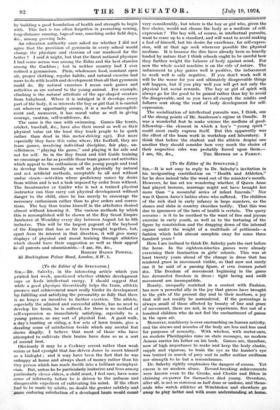[To the Editor of the SPECTATOR.] Slip,—Dr. Saleeby, in the
interesting article which you printed last week, questioned whether athletic development saps or feeds intellectual energy. I should suggest that while a good physique theoretically helps the brain, athletic prowess and achievement must really hinder its development bye fulfilling and. satisfying the personality_ so _fully that there is no longer an incentive to further exertion. The athlete, especially the admired and successful athlete, has no need to develop his brain, he is sufficed, for there is no method of self-expression so immediately satisfying, especially to a young person, as any sort of physical feat. A good walk, a day's hunting or riding, a few sets of lawn tennis, give a dazzling sense of satisfaction beside which any mental feat shows dingily. I believe that most of those who have attempted to cultivate their brains have done so as a sort of second best.
Obviously it may be a Cockney accent rather than weak wrists or bad eyesight that has driven Jones to assert himself as a biologist ; and it may have been the fact that he was .unhappy at home and always short of money rather than his
tiny person which has made Smith into a brilliant metaphysi- cian. But, unless he be particularly imitative and lives among
particularly clever elders, a child must, I feel sure, have some sense of inferiority before he is driven to the arduous and disagreeable expedient of cultivating his mind. If the effort had to be made by adults, no doubt the greater subtlety and Anore enduring satisfaction of a developed brain would count very considerably, but where is the boy or girl who, given the free choice, would not choose the body as a medium of self- expression ? The boy will, of course, in intellectual pursuits, want to come up to a standard, and will want to avoid making a fool of himself, but his desire for excellence, for self-expres- sion, will at that age seek wherever possible the physical medium. It is because the dice have already been so heavily loaded by nature that I think schools ought to be careful how they further weight the balance of body against mind. For now the whole social machine is on the side of nature. The inducement to play games well is positive, the inducement to work well is only negative. If you don't work well it will be the worse for you and ultimately disagreeable things will happen, but if you play well you will get not only the physical but social rewards. The boy or girl of spirit will always go for the good to be gained rather than try to avoid the disagreeable, and so you have all except the misfits and failures sent along the road of body development for self- expression.
The socialization of intellectual pursuits was, I think, one of the strong points of Mr. Sanderson's regime at Oundle. It was a wonderful feat. to make science the medium of good- fellowship—the element in which a boy's " young spirit " could most easily express itself. But this apparently was the effect of the team work in workshop and laboratory. I think that before the student and the athlete despise one another they should consider how- very much the choice of their respective roles was probably forced upon them.— I am, Sir, &c., Tau MOTHER OF A FAMILY.






































 Previous page
Previous page